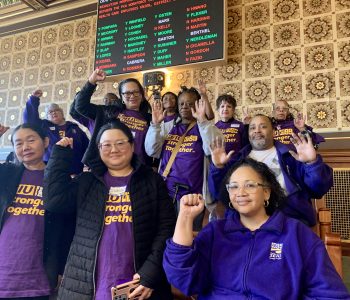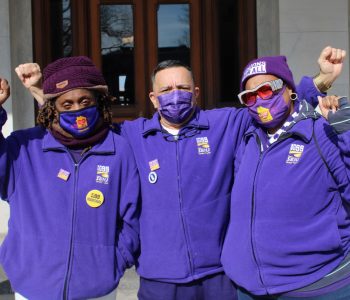For me, July 1 is my “a little more Independence Day.”
I’m getting a raise from $15.85 to $16.25 an hour, along with 10,000 personal care attendants like me who with our union negotiated a raise through Connecticut’s Medicaid waiver program.
It’s more than I ever expected to make, but life in Connecticut, where you need to make at least $20 an hour to manage the cost of living, will still be a struggle. It’s a struggle for all workers who must get along at the bottom of the economic ladder, many of whom are people of color.
Getting this hard-fought pay increase is a victory, but we can’t stop until we reach a wage that offers workers full dignity and respect.
I work 38 hours a week with my 85-year-old client who suffers from dementia. I help her out of bed, assist her in the bathroom and do other physical tasks that she is too frail to handle at home alone. I love the job. It’s the work I’ve been doing for 16 years, the last five in Middletown, which is where both my client and I live.
I was lucky to get this job because my apartment isn’t too far from my client’s home. I couldn’t afford a car and depended on other people for rides or spending extra money on Lyft. I manage to survive, but I’m somebody who has always had to live off somebody. You just don’t make very much doing this work.
People will say to me, “That’s such a noble job.” But when you say personal care workers should make more money, they will turn around and say, “You get a lot for what you do.”
We are taking care of people’s loved ones, handling the emotional work and the physical work. I’m part of the family.
Now, the work includes taking extra precautions to make sure my client and I avoid exposure to COVID-19. Doctors have told me that my client would be at serious risk should she contract the virus. She gets anxious when she sees me in my protective mask and thinks that somehow she has been moved from her home to the hospital. I try to keep her laughing and talking. That’s what I’m good at. But I also want to get paid like I’m human.
Don’t get me wrong. The raise is amazing. Now, I can actually afford to own a car and pay the insurance on it without any help. Knowing that this raise was coming allowed me to buy a little red 2008 Hyundai. I can go to my job without worrying about how to get there and will have more flexibility about taking on other clients in the future.
Even with the raise, I will still be sharing an apartment, but I’ll be a little more independent.
Like other personal care attendants under contract with the state, I still don’t get paid for sick days, vacation days or taking holidays off. We do get extra pay for working holidays and workers compensation. I was glad of that recently as I cracked a rib on the job and had to take three weeks off to let it heal. In our work, when a client falls, they fall on us. We use our bodies.
About 80 percent of the personal care attendants in Connecticut are women. About 60 percent of us are people of color, and about 30 percent of us are immigrants. This includes the personal care attendants who work for private agencies in Connecticut. They are not under the contract that sets union members’ wages and are often paid the at the state’s bare minimum wage rate of $11 an hour for the same work. To survive in Connecticut, they must have some kind of outside income. Many of them work one or two other jobs. I tried taking on more than one job a few years ago, but the nature of our work is exhausting, and I couldn’t keep it up.
I’m looking forward to having a bigger paycheck, and I’ll enjoy driving my 12-year-old car to work. Nevertheless, we all want to make this profession more respected as we help our consumers to live independently at home. We deserve a living.
Claire Martin is a member of the Service Employees International Union 1199. She lives in Middletown.






